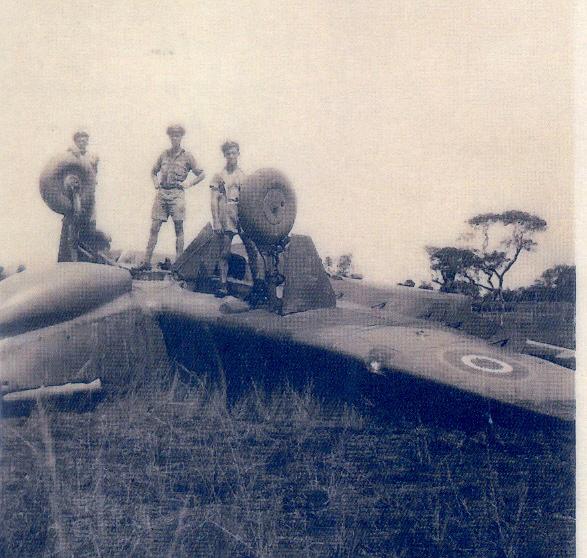´I noticed that the fuel gauges were reading differently… losing petrol at a tremendous rate… would have to force land… saw a clearing in the bush… touched down… felt the plane lurch and the nose sink… propeller struck the ground… nose dug into the ground. the tail rose until the aircraft was perpendicular… carried on over… crouched low in the cockpit to avoid crushing my head…a terrific crash, a juddering, and then quietness … first thought was that I was unhurt …quickly dispelled by the thought of fire.´
My New Zealand father, John ‘Jack’ McGregor, then aged 22 had just crashed his aircraft, a Boulton Paul Defiant in the West African equatorial forest on October 10th 1944. The above was an excerpt from his reported account of the accident. Seventy miles from the nearest small French outpost, Dad managed to befriend the natives and with their considerable help managed to get word of his survival to his base. With resourcefulness and stamina Dad eventually made it back to safety. But then, my father was a very capable man.
As I grew up in the 1950s in England, I soon noticed my Dad was not like others. He was not a sit-you-on-his-knee, or ‘this is how you do it, son’ type of father. Not that he wasn’t tactile, one of my earliest and treasured memories is clinging onto his strong neck tightly as we swam in the sea. My father’s measured crawl stroke was as rhythmic as his flowing tennis backhand, neither of which I could ever replicate with any success. But it was Dad’s example of living that has always inspired me. He epitomised the strong silent male role model, very much of its time, definitely not ‘PC’ today. His own father had tragically died when he was only two, and he and his four siblings were brought up with an iron hand by their tiny widowed mother.
Those tough early years made Dad his own man: deep, quiet, dignified and respected by his peers. That strength of character was exemplified by his build: solid, broad-shouldered, his tanned facial features heavy, the ‘lived-in’ steady gaze seemed to go right into you. I took after my mother in some ways, but make no mistake, it was Dad I wanted to emulate: I still do. We all grew up with a family joke, used against you when complaining you couldn’t do something.
‘I can’t…’ was always greeted with ‘What’s your name?’
‘McGregor!’ was inevitably the only answer, which said everything: the unspoken assumption was that you could achieve anything you wanted to if your name was McGregor; there was no such word as can’t.
There are clues as to where this seemingly arrogant example of attitude to life, exemplified by our surname came from. I suggest it is in the genes, in the blood, handed down through the centuries.
Originally dating from royal Scottish descent nearly one thousand years ago, the McGregor clan was persecuted and outlawed in the 1600’s. Rob Roy was said to surmount this adversity with considerable courage to earn the family its respectability again, despite savage hardship. This ability to bounce back from desperate circumstances was to provide the family motto ‘The McGregors, despite them, will flourish forever’. That certainly stood Dad in good stead in West Africa in 1944.
At our boys’ grammar school, aged twelve I was proud to be selected as captain for the school rugby team at scrum half, rugby was Dad’s first sporting love. McGregors always played scrum half, one predecessor played for the All Blacks on the 1909 UK tour. At our first game one cold, wet Saturday, Dad came to watch with my little brother. Midway through the second half we were drawing. As the rain poured down I collected the ball from the back of the scrum, and spotted a gap. Going for the line, I avoided two or three tackles and scored in the corner. Walking back and receiving a few congratulatory pats I glowed in the cold; but I didn’t dare look over at Dad. We won, but little was said afterwards returning in the car; neither was anything said at home. Eventually I plucked up my courage and approached Dad in the garden, pruning his beloved roses.
‘What did you think of my try?’ I asked hesitantly.
‘You should have passed it out’, he simply replied, smiling his trademark one-sided grin. I should have realised there and then that I was never going to get praise from Dad; but it didn’t stop me craving it…
By John McGregor





